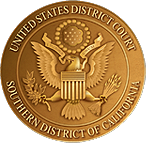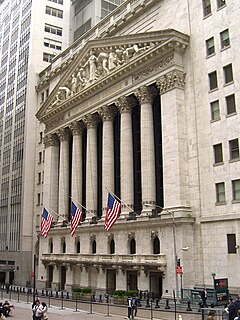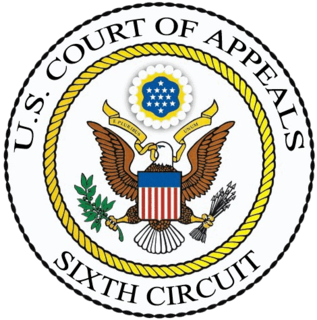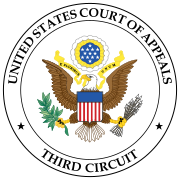
In the United States, antitrust law is a collection of mostly federal laws that regulate the conduct and organization of businesses to promote competition and prevent unjustified monopolies. The main statutes are the Sherman Act of 1890, the Clayton Act of 1914 and the Federal Trade Commission Act of 1914. These acts serve three major functions. First, Section 1 of the Sherman Act prohibits price fixing and the operation of cartels, and prohibits other collusive practices that unreasonably restrain trade. Second, Section 7 of the Clayton Act restricts the mergers and acquisitions of organizations that may substantially lessen competition or tend to create a monopoly. Third, Section 2 of the Sherman Act prohibits monopolization.
The Telephone Consumer Protection Act of 1991 (TCPA) was passed by the United States Congress in 1991 and signed into law by President George H. W. Bush as Public Law 102-243. It amended the Communications Act of 1934. The TCPA is codified as 47 U.S.C. § 227. The TCPA restricts telephone solicitations and the use of automated telephone equipment. The TCPA limits the use of automatic dialing systems, artificial or prerecorded voice messages, SMS text messages, and fax machines. It also specifies several technical requirements for fax machines, autodialers, and voice messaging systems—principally with provisions requiring identification and contact information of the entity using the device to be contained in the message.
The business judgment rule is a case law-derived doctrine in corporations law that courts defer to the business judgment of corporate executives. It is rooted in the principle that the "directors of a corporation... are clothed with [the] presumption, which the law accords to them, of being [motivated] in their conduct by a bona fide regard for the interests of the corporation whose affairs the stockholders have committed to their charge". The rule exists in some form in most common law countries, including the United States, Canada, England and Wales, and Australia.
Directors and officers liability Insurance is liability insurance payable to the directors and officers of a company, or to the organization(s) itself, as indemnification (reimbursement) for losses or advancement of defense costs in the event an insured suffers such a loss as a result of a legal action brought for alleged wrongful acts in their capacity as directors and officers. Such coverage can extend to defense costs arising out of criminal and regulatory investigations/trials as well; in fact, often civil and criminal actions are brought against directors/officers simultaneously. Intentional illegal acts, however, are typically not covered under D&O policies.
Dodge v. Ford Motor Company, 204 Mich. 459, 170 N.W. 668 is a case in which the Michigan Supreme Court held that Henry Ford had to operate the Ford Motor Company in the interests of its shareholders, rather than in a charitable manner for the benefit of his employees or customers. It is often taught as affirming the principle of "shareholder primacy" in corporate America, although that teaching has received some criticism. At the same time, the case affirmed the business judgment rule, leaving Ford an extremely wide latitude about how to run the company.
A shareholder derivative suit is a lawsuit brought by a shareholder on behalf of a corporation against a third party. Often, the third party is an insider of the corporation, such as an executive officer or director. Shareholder derivative suits are unique because under traditional corporate law, management is responsible for bringing and defending the corporation against suit. Shareholder derivative suits permit a shareholder to initiate a suit when management has failed to do so. To enable a diversity of management approaches to risks and reinforce the most common forms of corporate rules with a high degree of permissible management power, many jurisdictions have implemented minimum thresholds and grounds to such suits.

The Supreme Court of Delaware is the sole appellate court in the United States state of Delaware. Because Delaware is a popular haven for corporations, the Court has developed a worldwide reputation as a respected source of corporate law decisions, particularly in the area of mergers and acquisitions.

Smith v. Van Gorkom 488 A.2d 858 is a United States corporate law case of the Delaware Supreme Court, discussing a director's duty of care. It is often called the "Trans Union case". Van Gorkom is sometimes referred to as the most important case regarding business organizations because it shows a unique scenario when the board is found liable even after applying the business judgment rule. The decision "stripped corporate directors and officers of the protective cloak formerly provided by the business judgment rule, rendering them liable for the tort of gross negligence for the violation of their duties under the rule."
TSC Industries, Inc. v. Northway, Inc., 426 U.S. 438 (1976), was a case in which the Supreme Court of the United States articulated the requirement of materiality in securities fraud cases.

Alcatel-Lucent v. Microsoft Corp., also known as Lucent Technologies Inc. v. Gateway Inc., was a long-running patent infringement case between Alcatel-Lucent and Microsoft litigated in the United States District Court for the Southern District of California and appealed multiple times to the United States Court of Appeals for the Federal Circuit. Alcatel-Lucent was awarded $1.53 billion in a final verdict in August 2007 in the U.S. District Court for the Southern District of California in San Diego. The damages award was reversed on appeal in September 2009, and the case was returned for a separate trial on the amount of damages.

Cheff v. Mathes, 199 A.2d 548, was a case in which the Delaware Supreme Court first addressed the issue of director conflict of interest in a corporate change of control setting. This case is the predecessor to future seminal corporate law cases including: Unocal Corp. v. Mesa Petroleum Co., Revlon v. MacAndrews, and Paramount v. Time.

Stephen Joseph Murphy III is a United States District Judge of the United States District Court for the Eastern District of Michigan.
Feist Publications, Inc., v. Rural Telephone Service Co., 499 U.S. 340 (1991), was a decision by the Supreme Court of the United States establishing that information alone without a minimum of original creativity cannot be protected by copyright. In the case appealed, Feist had copied information from Rural's telephone listings to include in its own, after Rural had refused to license the information. Rural sued for copyright infringement. The Court ruled that information contained in Rural's phone directory was not copyrightable and that therefore no infringement existed.

United States corporate law regulates the governance, finance and power of corporations in US law. Every state and territory has its own basic corporate code, while federal law creates minimum standards for trade in company shares and governance rights, found mostly in the Securities Act of 1933 and the Securities and Exchange Act of 1934, as amended by laws like the Sarbanes–Oxley Act of 2002 and the Dodd–Frank Wall Street Reform and Consumer Protection Act. The US Constitution was interpreted by the US Supreme Court to allow corporations to incorporate in the state of their choice, regardless of where their headquarters are. Over the 20th century, most major corporations incorporated under the Delaware General Corporation Law, which offered lower corporate taxes, fewer shareholder rights against directors, and developed a specialized court and legal profession. Nevada has done the same. Twenty-four states follow the Model Business Corporation Act, while New York and California are important due to their size.
Jerome William Van Gorkom was a United States businessman who was U.S. Under Secretary of State for Management 1982–83. He served as the CEO of TransUnion for eighteen years. Van Gorkom is probably best known as the named defendant in the landmark corporate law case of Smith v. Van Gorkom, 488 A.2d 858, which involved the merger of TransUnion with the Marmon Group in 1980.
In re Walt Disney Derivative Litigation, 907 A 2d 693 (2005) is a U.S. corporate law case concerning the scope of the duty of care under Delaware law. Disney is the leading case on executive compensation.

United States v. Warshak, 631 F.3d 266 is a criminal case decided by the United States Court of Appeals for the Sixth Circuit holding that government agents violated the defendant's Fourth Amendment rights by compelling his Internet service provider (ISP) to turn over his emails without first obtaining a search warrant based on probable cause. However, constitutional violation notwithstanding, the evidence obtained with these emails was admissible at trial because the government agents relied in good faith on the Stored Communications Act (SCA). The court further declared that the SCA is unconstitutional to the extent that it allows the government to obtain emails without a warrant.

Joy v. North, 692 F.2d 880 is a US corporate law case, concerning the rules for bringing a corporate derivative suit. The case arose under Connecticut law, but the opinion extensively discussed by analogy the relevant standards under Delaware and New York law.
Merrill Lynch, Pierce, Fenner & Smith Inc. v. Manning, 578 U.S. ___ (2016), was a United States Supreme Court case in which the Court held, 8–0, that the jurisdictional test established by §27 of the Securities Exchange Act of 1934 is the same as 28 U.S.C. § 1331's test for deciding if a case "arises under" a federal law.
United States v. Miller, 425 U.S. 435 (1976), was a United States Supreme Court that held that bank records are not subject to protection under the Fourth Amendment to the United States Constitution. The case, along with Smith v. Maryland, established the principle of the third-party doctrine in relation to privacy rights.







